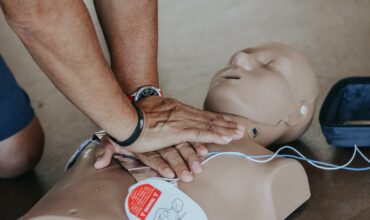- Your cart is empty
- Continue Shopping


Automated External Defibrillators (AEDs) are portable devices that can be used to treat sudden cardiac arrest (SCA), a condition that can be deadly if not treated quickly.
These devices are designed to be easy to use, even by individuals with no medical training. In recent years, AEDs have become increasingly common in public places, including schools, malls, airports, and other locations.
While the presence of AEDs in public places can potentially save lives, their use raises a number of legal and ethical questions.
In this article, we will explore the role of AEDs in public places and examine some of the key considerations for organizations and individuals who are thinking about deploying these life-saving devices.
First, let’s take a look at the legal landscape surrounding AEDs in public places. In many jurisdictions, laws have been enacted to encourage the use of AEDs by providing legal protection for individuals who use them in good faith.
For example, the Good Samaritan laws in many states provide immunity from civil liability for individuals who use AEDs to try to save a life.
At the same time, however, there are also certain legal requirements that organizations and individuals must consider when deploying AEDs in public places.
For example, in many states, it is required that AEDs be registered with the local emergency medical services (EMS) agency and that they be properly maintained and tested on a regular basis.
Additionally, organizations and individuals who choose to deploy AEDs may be required to provide training to their employees or volunteers on how to properly use the device.
In addition to the legal considerations, there are also ethical concerns that must be considered when deploying AEDs in public places.
One of the key ethical issues is the potential for AEDs to be used in a discriminatory manner. For example, some people may be hesitant to use an AED on an individual who appears to be homeless or drug-addicted, even if that person is in need of urgent medical attention.
To address this issue, it is important for organizations and individuals who are deploying AEDs to establish clear policies and procedures for their use, and to provide training on how to use the devices in a non-discriminatory manner.
Additionally, it is important to educate the public on the importance of using AEDs in emergency situations, regardless of the individual’s circumstances.
Overall, the use of AEDs in public places has the potential to save lives, but it also raises a number of legal and ethical considerations that must be carefully considered.
By understanding the laws and ethical considerations surrounding the use of AEDs, organizations and individuals can help ensure that these life-saving devices are used effectively and equitably in emergency situations.
Implementation Guide